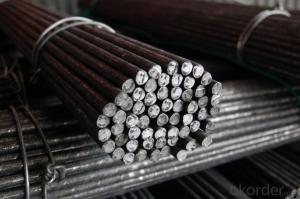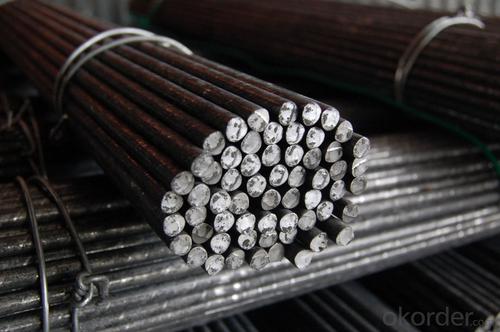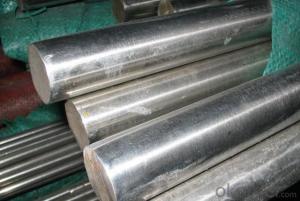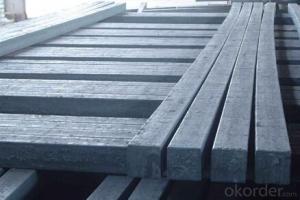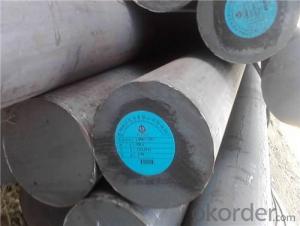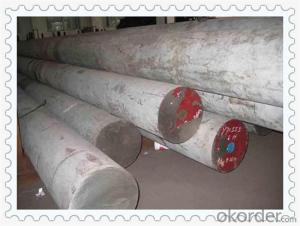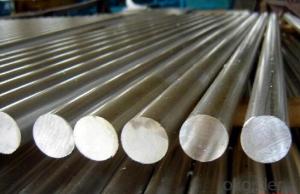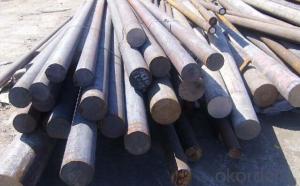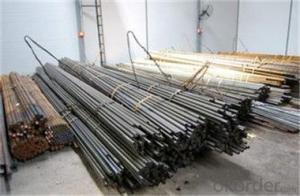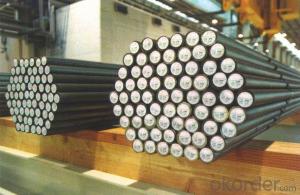Round Bar 42CrMo 4140 Steel of CNBM
- Loading Port:
- Shanghai
- Payment Terms:
- TT OR LC
- Min Order Qty:
- 25 m.t.
- Supply Capability:
- 50000 m.t./month
OKorder Service Pledge
OKorder Financial Service
You Might Also Like
Specification
Round Bar 42CrMo 4140 Steel of CNBM
Product Description:
1. Sizes: Diameter: 16mm-300mm; Length: 6m, 9m, 12m
2. Grade: 42CrMo, 4140,42CrMov
3. Invoicing on theoretical weight or actual weight as customer’s request
4. Shape: Round bar, solid bar of steel with circular section
5. Technique: Hot rolled, forged, cold rolled
Specification:
Material | 42CrMo | Round bar | Dia(mm) | 16-600 |
Process | EAF + LF + VD + Forged + Heat Treatment (optional) | Length (mm) | Max 12000 | |
Heat treatment | Normalized / Annealed / Quenched / tempered | Flat bar | Thickness(mm) | 8-500 |
Delivery condition | Hot forged +Rough machined (black surface after Q/T)+ Turned (optional) | Width(mm) | 70-200 | |
Test | Ultrasonic test according to SEP 1921-84 D/d | Length (mm) | Max 12000 |
Chemical Composition:
C | Si | Mn | Cr | Ni | Cu |
0.38~0.45 | 0.17~0.37 | 0.50~0.80 | 0.9-1.2 | ≤0.030 | ≤0.030 |
Packing and Delivery:
Packing in bundle with steel strips and shipped by break bulk vessel or container (depend on target market and different ports)
Delivery Detail: Approx.45 days
Usage and Applications:
1. Steel round bar is used in a large number of architectural and engineering structures. Or it can be used in construction of plants for the production of steel house frames, high-voltage transmission towers, bridges, vehicles, boilers, containers, ships, etc.
2. And we can use this kind of product on the performance of the mechanical parts if the demand is not very high.
3. Some especial material steel round bar can be used for main shaft of steamer, hummer shank, with big section and supper force.
Product Show:
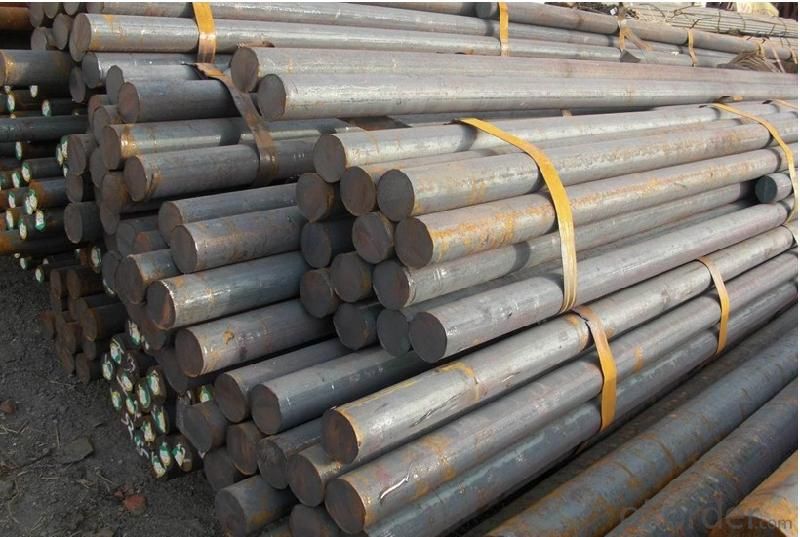
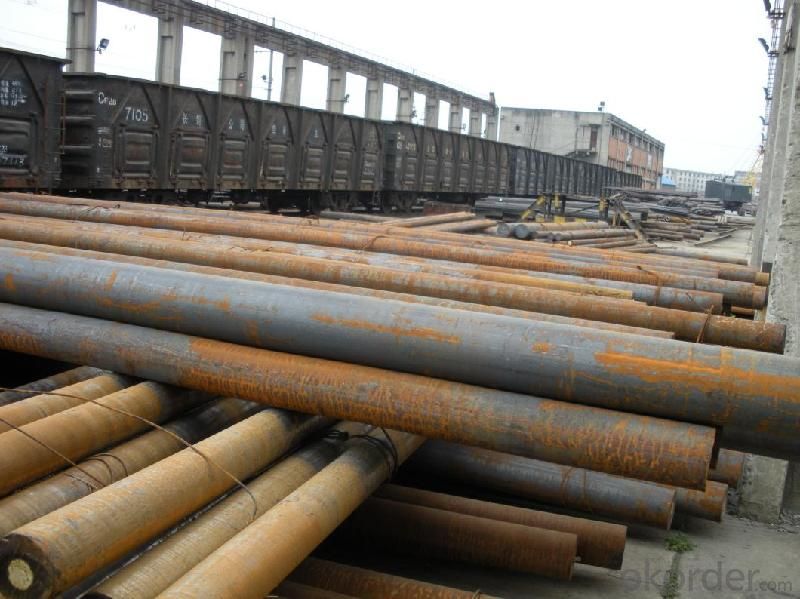
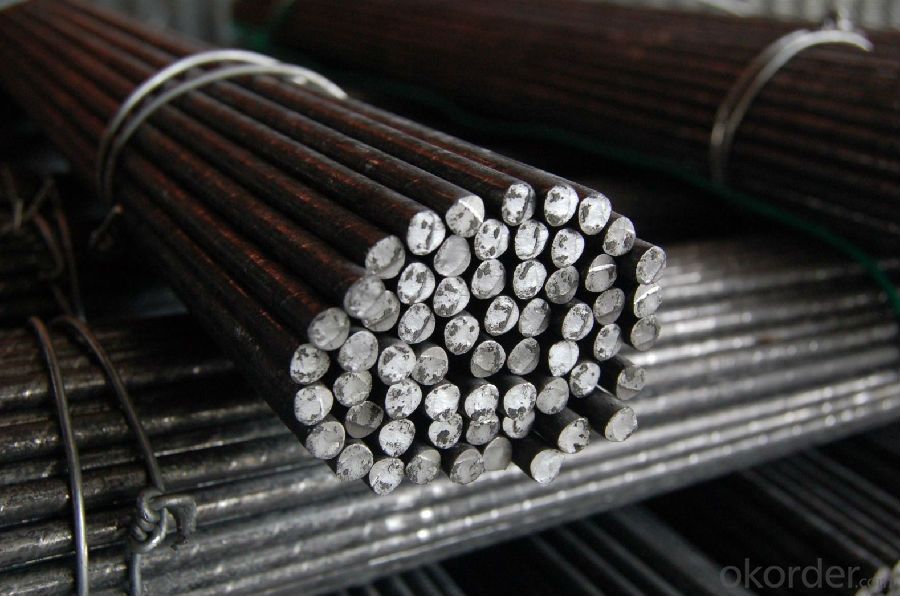
- Q: How is special steel used in the production of hydraulic components?
- Special steel is used in the production of hydraulic components due to its high strength, corrosion resistance, and ability to withstand extreme pressure and temperature conditions. It helps in manufacturing durable and reliable hydraulic parts such as cylinders, valves, fittings, and pistons, ensuring efficient functioning and long-lasting performance of hydraulic systems.
- Q: Can special steel be used for making aerospace engine components?
- Certainly, aerospace engine components can be made using special steel. The aerospace industry commonly utilizes special steel alloys, such as nickel-based superalloys and stainless steels, due to their remarkable mechanical properties, ability to withstand high temperatures, and superior resistance to corrosion. These alloys are specifically engineered to endure the extreme conditions and demands of aerospace engines, including high temperatures, pressures, and stress levels. Moreover, special steel alloys offer a high strength-to-weight ratio, which is crucial in reducing the weight of aerospace components while preserving their structural integrity. Consequently, the utilization of special steel in aerospace engine components ensures the dependability, performance, and safety of engines in aeronautical applications.
- Q: What are the applications of special steel in the manufacturing sector?
- Special steel has various applications in the manufacturing sector due to its unique properties. It is commonly used in industries such as automotive, aerospace, construction, and machinery. Special steel's high strength, corrosion resistance, and heat resistance make it ideal for manufacturing components like gears, shafts, bearings, and tools. Additionally, its ability to withstand extreme temperatures and pressures makes it suitable for applications in boilers, turbines, and pressure vessels. Overall, special steel plays a crucial role in enhancing the performance and durability of products in the manufacturing sector.
- Q: What are the environmental impacts of manufacturing special steel?
- Manufacturing special steel has significant environmental impacts due to its energy-intensive production process and the extraction of raw materials. The production of special steel requires high temperatures and uses large amounts of fossil fuel-based energy, resulting in substantial greenhouse gas emissions contributing to climate change. Additionally, the extraction of iron ore and other raw materials for steel production can lead to deforestation, habitat destruction, and water pollution. The disposal of steel waste and byproducts also poses challenges, as it can contaminate soil and water sources. Therefore, the environmental impacts of manufacturing special steel must be carefully managed and mitigated through sustainable practices and technologies.
- Q: What are the environmental impacts of using special steel?
- The environmental impacts of using special steel can vary depending on factors such as the production process, sourcing of raw materials, and waste management practices. However, some common environmental impacts associated with special steel production include carbon dioxide emissions, energy consumption, water pollution, and habitat destruction. Special steel often requires high energy inputs and releases significant amounts of greenhouse gases during production, contributing to climate change. Additionally, the extraction and processing of raw materials used in special steel production can lead to water pollution and habitat degradation if not managed properly. It is important for industries to adopt sustainable practices and technologies to minimize these environmental impacts and promote a more sustainable use of special steel.
- Q: What are the different methods for annealing special steel?
- There are several methods for annealing special steel, including full annealing, process annealing, stress relief annealing, and spheroidizing annealing. Full annealing involves heating the steel to a temperature above the critical range and then slowly cooling it to room temperature. Process annealing is used to improve machinability and involves heating the steel to a temperature below the critical range and then cooling it in still air. Stress relief annealing is carried out to reduce internal stresses in the steel by heating it to a temperature below the critical range and then cooling it slowly. Spheroidizing annealing is used to improve the steel's formability and involves heating it to a temperature below the critical range and then cooling it slowly. Each method has its own specific purpose and benefits for annealing special steel.
- Q: How does special steel contribute to the mining aftermarket industry?
- The mining aftermarket industry heavily relies on special steel to improve durability, strength, and resistance in extreme conditions. This particular type of steel is explicitly engineered to withstand the demanding environments and heavy loads associated with mining operations. Within the mining aftermarket industry, special steel is utilized to manufacture a wide range of equipment and components, including drill bits, cutting tools, crusher parts, and wear plates. These components endure intense wear and tear due to the abrasive materials present in mining. Special steel, possessing exceptional hardness and toughness, guarantees that these components can endure harsh conditions and maintain peak performance for extended periods. Moreover, special steel facilitates the creation of more efficient and productive mining equipment. By implementing high-strength steel alloys, manufacturers can design lighter equipment without compromising on strength and durability. This outcome leads to increased productivity and reduced operating costs for mining companies. Special steel also contributes significantly to the safety of mining operations. The robustness and reliability of steel components reduce the risk of unforeseen failures, which can result in accidents and downtime. Additionally, special steel exhibits resistance to extreme temperatures, corrosion, and other environmental factors commonly encountered in mining, minimizing the need for frequent replacements and repairs. In conclusion, special steel is indispensable to the mining aftermarket industry as it provides the essential strength, durability, and resistance to extreme conditions required for mining equipment and components. Its presence enhances productivity, lowers operating costs, and ensures the safety of mining operations, making it a crucial material within the mining industry.
- Q: What are the advantages of using special steel in specific applications?
- There are several advantages of using special steel in specific applications. Firstly, special steel offers enhanced strength and durability compared to regular steel. It has higher tensile strength and better resistance to wear and tear, making it ideal for applications where high strength is required, such as in construction, automotive, and aerospace industries. This ensures that the components made from special steel can withstand heavy loads, extreme temperatures, and harsh operating conditions without deformation or failure. Secondly, special steel has excellent corrosion resistance properties. It can resist the effects of moisture, chemicals, and other corrosive elements, making it suitable for applications in marine environments, chemical processing plants, and offshore structures. Special steel can maintain its integrity and structural stability even when exposed to aggressive substances, thereby extending the lifespan of the equipment and reducing maintenance costs. Another advantage of using special steel is its versatility. It can be easily customized and tailored to meet specific requirements of different applications. Special steel can be engineered to have specific mechanical properties, such as hardness, toughness, or flexibility, depending on the desired application. This allows for greater adaptability and enables designers and engineers to create components that are optimized for their intended use. Furthermore, special steel often exhibits excellent heat resistance capabilities. It can withstand high temperatures without losing its mechanical properties, making it suitable for applications involving extreme heat, such as in the manufacturing of industrial furnaces, turbines, and engines. This heat resistance also allows the steel to retain its strength and shape, minimizing the risk of deformation or failure under elevated temperatures. Lastly, special steel offers superior machinability and weldability. It can be easily formed, cut, and welded into complex shapes and structures, allowing for efficient manufacturing processes and reducing production costs. Special steel's machinability also ensures accurate and precise fabrication, resulting in high-quality components that meet strict industry standards. In conclusion, the advantages of using special steel in specific applications include enhanced strength, durability, corrosion resistance, versatility, heat resistance, and excellent machinability. These properties make special steel a preferred choice for various industries, where reliability, performance, and longevity are paramount.
- Q: How does special steel contribute to the automotive parts industry?
- Special steel plays a crucial role in the automotive parts industry as it offers enhanced strength, durability, and resistance to corrosion. This type of steel is specifically designed to meet the demanding requirements of various automotive components, such as engine parts, chassis, and suspension systems. By utilizing special steel, automakers can ensure that their vehicles possess the necessary structural integrity and reliability, ultimately enhancing safety and performance. Additionally, the use of special steel allows for the production of lighter and more fuel-efficient vehicles, contributing to the industry's efforts in reducing carbon emissions and promoting sustainability.
- Q: What are the properties of special steel?
- Special steel has several unique properties that set it apart from regular steel. First and foremost, it is known for its exceptional strength and durability. Special steel is often alloyed with other elements such as chromium, nickel, or molybdenum, which enhance its hardness and corrosion resistance. Additionally, this type of steel has high temperature resistance, making it suitable for applications that involve extreme heat or pressure. Special steel also exhibits excellent machinability, weldability, and formability, allowing for easy shaping and processing. Overall, its remarkable properties make special steel a preferred choice in industries such as automotive, aerospace, and construction.
Send your message to us
Round Bar 42CrMo 4140 Steel of CNBM
- Loading Port:
- Shanghai
- Payment Terms:
- TT OR LC
- Min Order Qty:
- 25 m.t.
- Supply Capability:
- 50000 m.t./month
OKorder Service Pledge
OKorder Financial Service
Similar products
Hot products
Hot Searches
Related keywords
